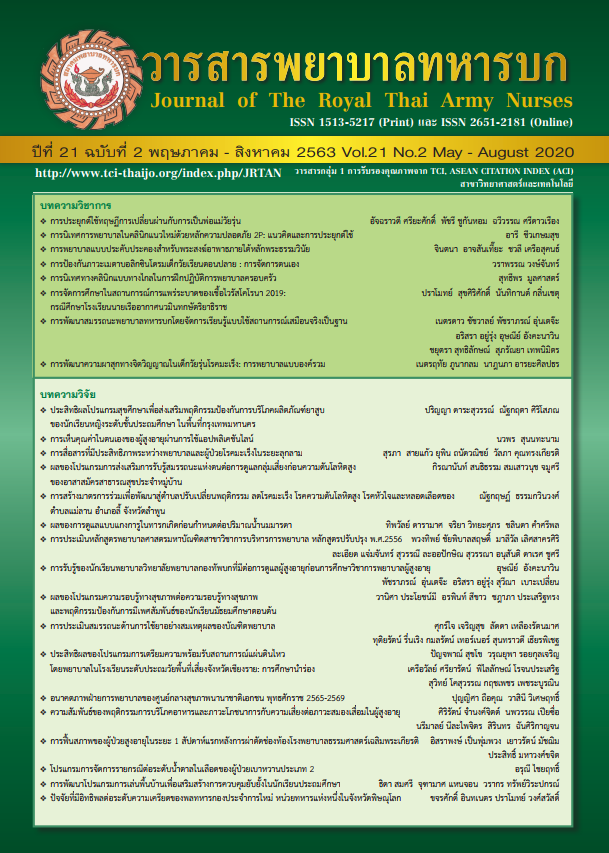Prevention of Metabolic Syndrome of Late School-age Children : Self-management
Keywords:
Metabolic Syndrome, Late School-aged Children, Self-managementAbstract
Late school-aged children are considers as a fundamental human resources that will lead prosperity and development to the nation. However, due to the present rapid advancement of technology which has significantly changed the lifestyles of the population, the risks of metabolic syndrome and non-communicable diseases has significantly increased in children, especially late school-aged which could lead to chronic illnesses. Late school-aged children are still learning to regulate and balance their lives therefore the matter has became a serious concern for the ministry of public health. Education should aim to develop and promote correct understanding, having right attitude toword having continuum health behavior, increase their potential to self-health in order to adjust healthy eating habits, exercise, rest, and stress management in order to prevent occurring of metabolic syndrome as well as ability to develop their healthy and having good quality of life.
Downloads
References
Boonchieng W. School health. Chiangmai: Chiangmai University printing. 2015;17-53. (in Thai).
Wongchan W. Health Literacy of Prevention Diabetes Mellitus Type 2 in School Age Children. Journal of The Royal Thai Army Nurses. 2019; 20(2): 1-9. (in Thai).
Bureau of Non Communicable Diseases, Department of Diseases Control. Chronic Disease Prevention and Control Manual. Nonthaburi: Ministry of Public Health; 2013. (in Thai).
Mallory AM, Angosta AD, Kawi J. A patient with metabolic syndrome and the role of the advanced practice registered nurse. Medsurg Nurs. 2014; 23: 245-250.
International Diabetes Federation. The IDF concensus worldwide definition of the metabolic syndrome. Belgium: International Diabetes Federation, 2009.
Grundy SM, Brewer JB, Cleeman JI, et al. Definition of metabolic syndrome: report of the National Heart, Lung and Blood Institute/American Heart Association Conference on scientific. Issues related to definition. Circulation. 2014; 109: 433-438.
Karnik S, Kanekar A. Childhood obesity: a global public health crisis. Int J Prev Med. 2012; 3(1): 1-7.
Nookong A. & Sanasuttipun W. Prevention of Metabolic Syndrome for School Adolescents: Participatory Action Research. Journal of Thailand Nursing and Midwifery Council. 2019; 34(2): 44-61 (in Thai)
Sunpakaew W, Sanasuttipun W, Sangperm P & Likitmaskul S. The Relationships between Social Support, Selected Factors and Food Consumption Behaviors in Adolescents at risk for Type 2 Diabetes. Kuakarun Journal of Nursing. 2014; 21 (Supplement December): 186-204. (in Thai).
Fredrick TS, Baby boomers court metabolic syndrome bulging middle-aged and oder adults beware. ics, Geriatrics. 2009; 64(9): 8-15.
Nettleton JA, Lutsey PL, Wany Y, et al. Diet soda intake and risk of incident metabolic syndrome and type 2 dibetes in the multi-ethnic study of atherosclerosis (MESA). Diabetes Care 2009; 32: 688-694.
Banko A, Harris TB, Mc Clain JJ, et al. Sedentary activity associated with metabolic syndrome independent of physical activity. Diabetes Care 2011; 34: 497-503.
National Health Development Plan No.12, Department of Strategy and Planning Division. Nonthaburi: Ministry of Public Health; 2017-2021. (in Thai).
Mo-suwan L. Obesity and abdominal obesity in children and adolescents. In Nittiyanant W, editor. Obesity and abdominal obesity. Bangkok: Sukhumvit Media Marketing: 2011.p. 57-70. (in Thai).
Buapian A, Hansakul A, Bunchonhatthakit P. The Developing Guilines of Health Promotion Activities for Body Weight Controlling Among Over Nutritions Students. Srinakarindvirote Journal of Physical Education. 2013; 17(1): 141-151.
Insri P, Jittanoon P, Piriyakoontorn S. The Development of a Health Behavior Modification Operating Manual for School-aged Children with Over Nutrition. Songklanagarind Journal of Nursing. 2015; 35(2): 177-190. (in Thai).
Youngwanichsetha S. Metabolic Syndrome: Consequences on Health, Prevention, and Management. Songkla Med J. 2015; 33(4): 207-215. (in Thai).
Kongsakul S, Kessomboon P. Knowledge and Behaviors of Snack Consumers in Rung Aroon Vitthya School, Pakchong District, Nakhonratchasima Province. Journal of Community Health Development Quarterly Khon Kaen University. 2018; 6(2): 257-271. (in Thai).
Devision of Physical Activity & Health, Department of Health Promotion of Physical Activity in Working age. Nonthaburi : Ministry of Public Health; 2016. (in Thai).
Montagna P, Chokroverty S. Handbook of clinical neurology: Sleep disorder, Part 1. Edinburgh: Elsevier. 2011.
Cain N, Gradisar, M. Electronic media use and sleep in school-aged children and adolescents: A review. Sleep Medicine. 2010; 11(8): 735-742.
Kanfer F. Self-management methods. In F. Kanfer & A. Goldstein (Eds). Helping people change: A textbook of methods, (3nd ed., p. 283-338) 1988; New York: Pergamon Press.
Downloads
Published
How to Cite
Issue
Section
License
บทความหรือข้อคิดเห็นใดใดที่ปรากฏในวารสารพยาบาลทหารบกเป็นวรรณกรรมของผู้เขียน ซึ่งบรรณาธิการหรือสมาคมพยาบาลทหารบก ไม่จำเป็นต้องเห็นด้วย
บทความที่ได้รับการตีพิมพ์เป็นลิขสิทธิ์ของวารสารพยาบาลทหารบก
The ideas and opinions expressed in the Journal of The Royal Thai Army Nurses are those of the authors and not necessarily those
of the editor or Royal Thai Army Nurses Association.






